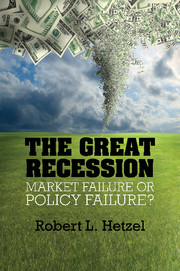Book contents
- Frontmatter
- Contents
- Figures
- Tables
- Preface
- One The 2008–2009 Recession
- Two Recessions
- Three The Great Contraction
- Four Monetary Policy and Bank Runs in the Great Depression
- Five Vigorous Recovery and Relapse
- Six Interwar International Monetary Experiments
- Seven Identifying the Shocks that Cause Recessions
- Eight From Stop-Go to the Great Moderation
- Nine Controlling Bank Risk Taking
- Ten The Housing Crash
- Eleven Bubble Trouble
- Twelve What Caused the Great Recession of 2008–2009?
- Thirteen What Caused the Great Leverage Collapse?
- Fourteen The Distinctions Between Credit, Monetary, and Liquidity Policy
- Fifteen Fed Market Interventions
- Sixteen Evaluating Policy
- Seventeen The Business Cycle
- Eighteen Why Is Learning So Hard?
- Nineteen How Should Society Regulate Capitalism?
- Postscript
- Bibliography
- Index
- References
Twelve - What Caused the Great Recession of 2008–2009?
Published online by Cambridge University Press: 05 May 2012
- Frontmatter
- Contents
- Figures
- Tables
- Preface
- One The 2008–2009 Recession
- Two Recessions
- Three The Great Contraction
- Four Monetary Policy and Bank Runs in the Great Depression
- Five Vigorous Recovery and Relapse
- Six Interwar International Monetary Experiments
- Seven Identifying the Shocks that Cause Recessions
- Eight From Stop-Go to the Great Moderation
- Nine Controlling Bank Risk Taking
- Ten The Housing Crash
- Eleven Bubble Trouble
- Twelve What Caused the Great Recession of 2008–2009?
- Thirteen What Caused the Great Leverage Collapse?
- Fourteen The Distinctions Between Credit, Monetary, and Liquidity Policy
- Fifteen Fed Market Interventions
- Sixteen Evaluating Policy
- Seventeen The Business Cycle
- Eighteen Why Is Learning So Hard?
- Nineteen How Should Society Regulate Capitalism?
- Postscript
- Bibliography
- Index
- References
Summary
The monetary-disorder explanation of the 2008–2009 recession proposed here discounts any role for expansionary monetary policy in 2003–2004 and instead points to contractionary monetary policy in 2008 (Hetzel 2009b; 2009c). The explanation starts with two shocks: correction of an excess in the housing stock and a sharp increase in energy prices. Taken together, they initiated the recession that began in December 2007. By themselves, these shocks would probably have led to only a moderate recession. A moderate recession became a major recession in summer 2008 when the FOMC ceased lowering the funds rate while the economy deteriorated. In 2008, concerned that persistent high headline inflation would raise expected inflation above its implicit 2 percent target, the FOMC imparted the kind of inertia to reductions in the funds rate characteristic of the stop phases in stop-go monetary policy (Chapter 8).
Monetary policy in 2008 prior to the September 15 bankruptcy of Lehman Brothers departed in two ways from the monetary policy procedures that had characterized the Volcker-Greenspan era. First, the FOMC went back to the stop-go practice of associating the level of the funds rate with the stance of monetary policy rather than following a rule to determine the appropriate level of the funds rate. In particular, perhaps because of the lack of recent experience with operating in an environment of near-price stability, FOMC members assumed that the 2 percent funds rate set at the April 30, 2008, FOMC meeting represented expansionary monetary policy.Second, the FOMC went back to the stop-go practice in the stop phases of attempting to manipulate a negative output gap to restrain inflation. Rather than letting an inflation shock pass through to the price level while using core inflation as its target, it reacted to the high headline inflation produced by a persistent energy price shock.
- Type
- Chapter
- Information
- The Great RecessionMarket Failure or Policy Failure?, pp. 204 - 238Publisher: Cambridge University PressPrint publication year: 2012



